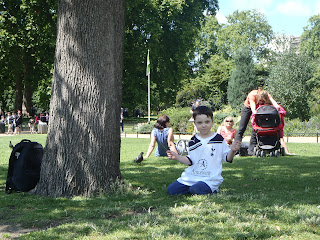Cerebral palsy (
CP) is an umbrella term for a group of non-progressive, non-contagious motor conditions that cause physical disability.
Cerebral palsy is caused by damage to the motor control centres of the developing brain and can occur during pregnancy, during childbirth or after birth up to about 3 years.
There are different types of CP all with varying degrees of severity
- Spastic (tight muscles) hemiplegia - is one side being affected.
- Spastic diplegia - is the lower extremities affected, with little to no upper-body spasticity.
- Spastic monoplegia - is one single limb being affected.
- Spastic triplegia - is three limbs being affected.
- Spastic quadriplegia - is all four limbs more or less equally affected.
- Antaxic - Ataxia type symptoms can be caused by damage to the cerebellum.
- Athetoid or dyskinetic - is mixed muscle tone – both hypertonia (tight muscles) and hypotonia (floppy muscles) mixed with involuntary movement.
Cerebral Palsy is caused by an injury to the brain before, during, or shortly after birth. In lots of cases, no one knows for certain what caused the brain injury or what may have been done to prevent the injury from happening.
Our Story
My son was diagnosed at just under 1yr old with Spastic Diaplegia Cerebral Palsy.
I had a bleed at 29 weeks. The neurologist we have seen said that he has Periventricular Leukomalacia or PVL for short. We know this because he had an MRI scan at 2yrs old. His scan showed enlarged, fluid filled ventricles that are in the middle of his brain. They should be thin slits but they are big holes. He has 2 tiny strips of white matter when there should be lots and the edges of his brain are jagged and do not meet the skull. His brain should be allot smoother and come up to his skull.
The neurologist says the bleed at 29 weeks starved him of oxygen and this caused the brain damage.
For my little man, his CP has affected his lower body mostly. He can not stand or walk un-aided. He wears AFO splints on both legs, a full body Lycra suit, gaiters for half an hour ever day, he is strapped into a standing frame for 1-2 hours every day, he is strapped into a corner seat with his AFO splints and gaiters on for 30 minuets every day, He has to use a walking frame at school and can use his frame to get about in buildings that are accessible, have smooth floors and space for him to manoeuvre. He has to wear a safety helmet whilst outside with his frame (in the park and the playground at school). He needs help with washing, dressing, toileting, getting in and out of bed, eating, all aspects of his education. He needs constant supervision in case he falls.
He has times where he loses all tone. His abilities at these times are much like a newborn. He can not even hold his head up. He spends his time either laid on his bed, the sofa or strapped and reclined in his wheelchair.
He CAN crawl, sit in a 'w' position (he sits on his knees with his feet out beside him) he can pull to stand, cruise round the furniture and he is incredible funny, smart and cute. He is a talented actor and attends stage school. He is very sporty and he has taken part in after school activities such as football and basketball. He has even tried out wall climbing with a local special needs club.
We find public transport hard. It upsets us when we cant get on buses/trains/trams because there is a buggy in the wheelchair space. Even more so when we're trying to get to a hospital appointment/going for an operation that we don't particularly want to go to.
There are days I wish that I could just bung a coat and a pair of shoes on him and go for a walk or to the shops. It would take 2 minuets. But instead I have to lift him into his wheelchair. Put splints and boots on his legs (which takes a while because I have to fight his high tone to get his feet in correct position before putting the splints on. Its like trying to bend a metal pole or a plank of wood)
At school he needs special seating, a writing slope, special pencil grips, 1:1 support, he needs toileting, someone to help him get his dinner, position him right at the dinner table, to cut his food and clean him up afterwards. He needs extra supervision in the playground, he has to use platform lifts to get up and down the stairs, misses lots of class time and often play time due to having physio therapy.
Last year he had an attendance of 70.3% due to the amount of hospital visits he has to have and illness.
Up until October 2010 he was incontinent. I'm very proud of him for getting dry day and night as the doctors had told us he would never have control over his bladder or his bowels.
Its hard. But I wouldn't change him for the world. I'd change the world for him though!


.jpg)










